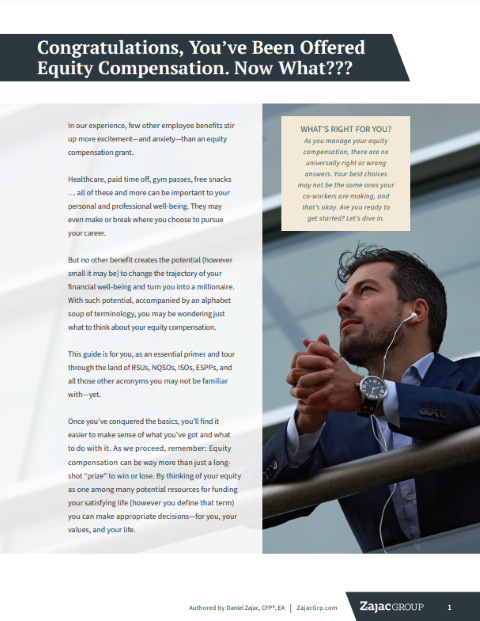
A donor-advised fund (DAF) can be particularly attractive in a year that you have significant equity compensation or employee stock option activity and your taxable income is higher than usual. Taxable income can be the byproduct of vesting restricted stock units and the exercise and sell of incentive stock options or non-qualified stock options. In a calendar year that your income is higher than normal, one way to help lower that tax burden is through charitable donations.
While finding the right charity and organizing your donation may take time, a Donor-Advised Fund can allow you to set aside assets for the donation now, even if you haven’t yet decided where you want your contributions to go. This might allow you to take a tax donation when your income is high, even if you aren’t quite ready to distribute the full amount to charity right away.
If charitable giving is one you’re your goals and you find yourself in an atypical high-income tax year, you may be able to manage this high-income tax year through charitable giving with a Donor-Advised Fund.
What is a Donor-Advised Fund?
A Donor-Advised Fund (DAF) is a special kind of fund created by IRS rules to allow for certain types of investments and charitable donations to receive preferential tax treatment.
With a DAF, you can contribute assets to your fund. While this is often in the form of cash or stocks, there are many different types of assets that may go into a DAF. Once in the DAF, these assets can be invested, and the money in the DAF can be donated to a public charity of the donor’s choice.
How does a Donor-Advised Fund Work?
After establishing a DAF account, you can fund the account with assets of your choosing. You may receive a tax deduction for the fair market value of the assets contributed to the DAF, but the assignment of assets to the DAF is irrevocable; you can never take the assets back out of the DAF account.
Assets in the DAF can be invested just like assets in a personal or company portfolio, and any gains to the DAF portfolio are tax-exempt. While some investors may manage their portfolios, many investors will use an investment advisor to help oversee their DAF investments.
The investor who started the DAF may choose to add more assets to the DAF later, and those additional gifts can also be tax-deductible at the time they’re added to the DAF.
When the time comes to disburse the money in the Donor-Advised Fund, you can choose to donate money to a wide range of charities. DAFs can donate to organizations that are tax-exempt under IRS Code 501(c)(3) and IRS Code 509(a). This includes most charitable organizations, churches and religious institutions, and medical, scientific, educational, and literary charities.
As you move into estate planning, you can assign trustees to your DAF, ensuring that your philanthropic legacy will continue with future generations of your family.
What are the Advantages of a Donor Advised Fund?
If you’re considering charitable giving, a DAF may be a great investment vehicle that allows you to give while still growing the resources you’re contributing.
Tax Benefits
One of the biggest advantages of a DAF is that the DAF may have immediate tax benefits. DAFs may allow you to receive a tax deduction in the calendar year that you contribute assets, so you can receive the deduction when your income is high and when you most need the deduction. You can then disburse the money to charities in later years when you’re ready. The DAF allows you to decide when you get the tax deduction and when you dole out the contribution, and it doesn’t have to be in the same year.
When assets are placed into the DAF, the donor may take a tax deduction in the year of the donation. When you donate appreciated stocks, mutual funds, real estate, and other assets, you may receive a tax deduction for up to 30% of your adjusted gross income (AGI) for the year. If the value of your gift exceeds 30% of your AGI, you can carry that deduction forward for up to five years. If you’re donating cash, you can generally deduct up to 60% of your AGI. Check with your tax advisor about your specific tax deductions and how they pertain to your unique contributions.
Because the tax deduction is given in the year the assets are placed into the DAF, it can be used as a vehicle to help offset taxable income in a year when a windfall or large capital gain may be realized. Higher income years may be particularly relevant in years that you have vesting restricted stock, exercising non-qualified stock options, and/or exercising and selling ISO in a disqualified sale.
Another tax advantage to the DAF is that assets inside the DAF can continue to appreciate in value on a tax-exempt basis.
Simplified Recordkeeping
Some donors who consider a DAF may also consider a private foundation. Compared to a private foundation, the Donor-Advised Fund is a simpler and easier way to contribute to charity.
A private foundation must make annual charitable contributions of roughly 5% of its prior year’s average net investment return to maintain its status as a private foundation. It must also maintain proper and correct recordkeeping with the IRS.
In contrast, a Donor-Advised Fund is not required to meet any particular standard for annual distributions, and the recordkeeping required is greatly reduced.
Investor Control
Once assets are donated to a DAF, that assignment is irrevocable. That is, the donor may not later remove their assets from the DAF. However, the donor still retains tremendous control over their DAF.
As a donor, you have the right to determine the investment strategy for your DAF and to assign investment managers if you wish, and you can typically select the charity or charities that you’d like to give contributions to. You can choose to give anonymously, or you can choose to be recognized for your donation. It’s up to you.
Building a Donor-Advised Fund: A Few Examples
Donating Cash
Let’s say that a donor with an AGI of $750,000 in year 1 and $250,000 in year 2 donates $400,000 in cash to their DAF.
Because $400,000 does not exceed the 60% limit for cash contributions to the DAF, the donor may deduct the full $400,000 from their AGI. Assuming an average tax rate of 37% in year 1 and 20% in year 2, a donor would be able to make the following deductions:
| Year 1 | Year 2 | |
| Annual Income (AGI) | $750,000 | $250,000 |
| Donation Amount | $400,000 | $0 |
| Adjusted AGI | $350,000 | $250,000 |
| Tax Liability Before Donation | $277,500 | $50,000 |
| Tax Liability After Donation | $129,500 | $50,000 |
| Potential Tax Savings | $148,000 | $0 |
Donating Appreciated Stock to a Donor Advised Fund
Let’s say that the same donor contributes $400,000 of appreciated stock to the DAF
In this situation, they may only deduct $225,000 (30% of their AGI) from their taxes in Year 1 and $75,000 in year 2. The remaining $100,000 will continue to be carried forward. Donating appreciated stock also means the donor will not sell the shares and incur capital gains tax. Yet they may still be entitled to a deduction for the full fair market value.
| Year 1 | Year 2 | |
| Annual Income (AGI) | $750,000 | $250,000 |
| Donation Amount | $400,000 | $0 |
| 30% Limit | $225,000 | $75,000 |
| Adjusted AGI | $525,000 | $175,000 |
| Carry Forward | $175,000 | $100,000 |
| Tax Liability Before Donation | $277,500 | $50,000 |
| Tax Liability After Donation | $194,250 | $35,000 |
| Potential Tax Savings | $83,250 | $15,000 |
Adding the tax savings in both years, this donor may receive total tax savings over two years of $98,250. The donor “only” benefits at a tax rate of 20% in year 2, and continues to carry forward a portion of the charitable deduction ($100,000) to year 3. As your tax rates change from year to year, you may find that the calculation of tax savings differs too.
A donation of appreciated stock may, in some situations, provide even greater tax savings when the sale of the stock might incur capital gains tax.
Selling vs Donating Stock to Fund a Donor Advised Fund
A single donor has $400,000 worth of stock. They are considering two different options to fund their DAF:
- Sell the stock, then use the proceeds to donate to charity or fund a DAF, paying tax from outside assets.
- Sell the stock, then use the after-tax proceeds to donate to charity or fund a DAF
- Donate the stock directly to a charity.
We’ve already reviewed the third option in the example above. But consider the first and second options. In both examples, the sale of the stock is a taxable event to the donor when the stock is sold. Assuming a cost basis of $1 per share on the stock, the reportable gain of a sale of stock is $390,000. Assuming a flat 20% tax rate means a tax bill of $78,000. The difference in our analysis between option 1 and option 2 is how the tax is accounted for in charitable giving.
Option 1 says that you chose to pay the tax bill out of pocket. This means that you donate $400,000, the full proceeds of the sale, to the Donor Advised Fund. The $78,000 tax bill is paid for out of pocket. If we then account for the potential tax savings from the charity contribution, we can calculate the total “cost” to be $330,000.
In option 2, you chose to give only the after-tax proceeds to charity. You sell the stock, pay income tax, and then donate the after-tax remainder to the Donor Advised Fund. This means that $322,000 is donated to charity, and after figuring the tax savings, the total cost to you is $280,860.
Illustrating this comparison of giving highly appreciated stock vs. selling the stock and giving cash vs. selling the stock, paying the tax, and giving the after-tax amount further illustrates the value of simply giving long-term stock, we can value the out-of-pocket “cost” of each scenario.
| Total Value | Cost Basis | Taxable Gain | Tax on Stock | After Tax | Contribution to Charity | Charitable Benefit | Total out of Pocket “Cost” | |
| Option 1 | $400,000 | $1.00 | $390,000 | $78,000 | $322,000 | $400,000 | $148,000 | $330,000 |
| Option 2 | $400,000 | $1.00 | $390,000 | $78,000 | $322,000 | $322,000 | $119,140 | $280,860 |
| Option 3 | $400,000 | $1.00 | 0 | 0 | $400,000 | $148,000 | $252,000 |
All else equal, the lowest cost in this comparison is giving the low basis shares direct as the donor avoids capital gains tax and maximizes the value of the contribution to charity.
Additional Tax Considerations
For these examples, we have used a flat tax rate to illustrate the impact of capital gains and income tax, but the tax system in the United States is not flat. In real life, smaller shifts in income and timing may make a big difference in your tax liability. Additional taxes like capital gains and AMT may also be a factor, so it’s important to check with a financial advisor or tax professional to ensure that you understand all your options.
Donor-Advised Funds and Your Legacy
DAFs are a great way to lower a tax bill in high-income years due to equity compensation activity. However, the total cost of contributing to a DAF will likely far outweigh any tax savings you receive. With that in mind, it is important that you are first convinced that you have enough to meet your own financial goals, and then that you are charitably inclined.
If you are, Donor-Advised Funds can be a great way to secure your legacy, fund causes that you believe in, and potentially reduce your tax burden, but like all investments, they require careful consideration and expert advice.
As with all investment and financial matters, there’s no one-size-fits-all solution. You’ll want to carefully evaluate your own personal goals, circumstances, and needs to determine whether a Donor-Advised Fund is a right option for you.
This material is intended for informational/educational purposes only and should not be construed as investment, tax, or legal advice, a solicitation, or a recommendation to buy or sell any security or investment product. The information contained herein is taken from sources believed to be reliable, however accuracy or completeness cannot be guaranteed. Please contact your financial, tax, and legal professionals for more information specific to your situation. Investments are subject to risk, including the loss of principal. Because investment return and principal value fluctuate, shares may be worth more or less than their original value. Some investments are not suitable for all investors, and there is no guarantee that any investing goal will be met. Past performance is no guarantee of future results. Talk to your financial advisor before making any investing decisions.



0 Comments